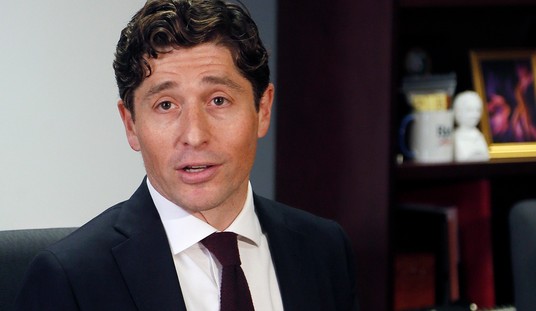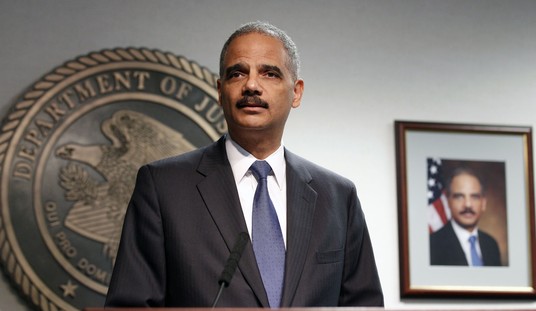This reminds me of yesterday’s post about taxing the childless insofar as both are fundamentally debates over what’s politically possible. Reihan Salam would rather spare everyone a tax hike and cut spending instead — but since that’s not happening anytime soon, he’s forced to choose the next most optimal alternative. That alternative is to make things easier on parents by raising taxes on people without kids. (Which, by the way, would hit liberals disproportionately hard. Presumably they’re A-OK with that given their fondness for tax hikes generally.) Same with the Palin/Ryan kerfuffle. Palin sees no reason to postpone meaningful cuts to the federal budget:
The latest Ryan (R, Wisconsin) Budget is not an April Fool’s joke. But it really IS a joke because it is STILL not seeing the problem; it STILL is not proposing reining in wasteful government overspending TODAY, instead of speculating years out that some future Congress and White House may possibly, hopefully, eh-who-knows, take responsibility for today’s budgetary selfishness and shortsightedness to do so. THIS is the definition of insanity. Do we still not understand how dangerous it is to allow government to grow unchecked as we shackle ourselves with massive debt – a good portion of which is held by foreign nations who don’t necessarily like us? If we can’t balance the budget today, what on earth makes us think it will happen at some future date? The solution is staring us in the face. We need to rein in spending today, and don’t tell me there is nothing to cut when we know every omnibus bill is loaded with pork and kickbacks.
There is, most assuredly, plenty of pork, waste, fraud, and abuse that could be trimmed today, but to make a real budget-balancing dent, we’ve got to reform entitlements. That’s where the point about political possibilities comes in. Here’s Kevin Williamson, a devout fiscal conservative, surveying the landscape and finding … virtually no appetite among voters for that:
My pessimism is rooted in my belief that there is not in reality a very large market for meaningful fiscal conservatism. People tell pollsters that they support balanced budgets and that they believe that our entitlement programs need to be reformed, and they tell them even more strongly that they oppose virtually all of the measures necessary to balance the budget or to reform entitlements…
But 2016 questions aside (and we really should put them aside for the moment), we must consider the question of how large a market there is for fiscal conservatism, and to answer that we might consider what will become of Representative Ryan’s newest budget proposal. Representative Ryan’s newest budget is very similar to his previous submissions, which laid down important fiscal markers but went nowhere politically. His budget submissions have never been perfect — nothing in real politics is perfect — and Senator Paul called Ryan’s 2012 proposal “tepid,” which exemplifies the underlying problem: Representative Ryan’s sober and compromising approach to fiscal conservatism is not aggressive enough to satisfy deficit-and-spending hawks, but it is too aggressive for the revealed preferences of the American electorate, who have provided themselves with Harry Reid and Barack Obama to act as prophylactics against fiscal reform.
Critics on the right will say that this new budget is not the best we can do, and they are correct: It is by all appearance far beyond the best we can do at the moment. The American public would be lucky to see the enactment of this budget, which would reduce the deficit down to digestible levels quite quickly. But they have no apparent appetite for it. Representative Ryan performs his thankless task admirably, but he is peddling broccoli outside of Baskin-Robbins.
Williamson wrote another piece along these lines recently, specifically regarding Rand Paul’s nascent presidential candidacy, and concluded that Paul’s a dead man walking because Americans really don’t oppose big government. They say they do, agreeing broadly when asked whether the federal leviathan’s too big and spends too much. But when you get into specifics about the programs that are driving the looming debt crisis — Social Security and Medicare — you find large majorities are reliably opposed. I’ve flagged polls before in which people are asked which parts of government, among 20 or listed, they’d like to see the feds spend less on. Reliably, the only item that draws majority support is foreign aid. How do you balance the budget soon in a political climate like that? Why would Ryan or the House GOP even propose doing so seven months out from a midterm election, given that Democrats will turn it into a Mediscare jamboree? The reason Ryan’s budget delays deep cuts is, I thought, because he understands that those cuts are impossible anyway until Republicans control government again. Nothing’s happening until 2017 at the very earliest. In which case, why destroy him for not envisioning action now?
One other thing I don’t understand: As Williamson notes, Ryan’s new budget isn’t much different from his last three budgets, which collectively made him a rock star in the GOP and landed him on the presidential ticket in 2012. Ryan himself notes the similarity in responding to Palin in the clip below (at 2:45). If delaying a balanced budget and phasing in Medicare reforms very gradually is RINO squishery, why were there so many people cheering this guy on for three years?








Join the conversation as a VIP Member